Having a strong sales intelligence tool at your fingertips is like having a superpower. It really is that big of a game-changer. They call it sales intelligence for a reason: it gives you the inside information about who the decision-makers are and how to reach them. Kind of like getting x-ray vision into a prospect company. But not every software package suits every organization. To figure out which of these highly rated sales intelligence tools is right for your team, we narrowed down the top six leading the market in 2024.
What is a sales intelligence tool?
Sales intelligence software gathers and processes data for companies to help support their go-to-market activities. They include a wide category of products that leverage information about prospects, customers, and market movements.
For instance, if you are creating a Go-to-Market strategy, sales intelligence will help you discover the most relevant leads, even in segments that you might not have considered.
Sales intelligence and lead generation
One of the most popular ways to use sales intelligence software is as a prospecting tool. Far beyond lists of anonymous connections, quality lead generation software will add valuable detail to your prospecting lists. For example:
- Segmentation of prospects into more defined customer categories
- Information about the exact role of individual prospects in their organization
- Buying signals that show a prospect’s likelihood to buy
Armed with this enhanced data, it’s much easier to create a customized pitch, which can make the difference between conversion and the phone going “click.”
Also, when you have accurate information on leads, you will spend less time going after dead ends or prospects who aren’t interested in your product. Instead, you can put more effort towards those high-potential prospects that have a better chance of closing deals.
What are the best sales intelligence tools for B2B lead generation?
Without further ado… Here are our picks for the market’s best sales intelligence tools, with a focus on how they help you build prospecting lists. When choosing the one that’s right for you, keep in mind both what you’re hoping to get out of the software as well as your budget.
1. Lusha
At first glance, the Lusha platform gives off a vibe of simplicity–and that’s no coincidence. Our software is known for a short and easy onboarding process that allows sales and marketing teams to get straight to what matters. This includes prospecting data such as phone numbers and emails that you can filter according to your ideal customer profile. And that’s just for the beginner package.
The more advanced packages – which offer higher ROI when compared to competitors – add platform features such as intent signals and technology stack profiles. Having all that information on hand adds crucial details for prospecting, prioritization, and personalization.
So much for quantity of information, but what about quality? Our data is fresh and verified, with a focus on direct contact information – not HQ numbers that get you nowhere. We also have dynamic data shaped by our customers’ specific needs, so that our database is constantly updated according to user feedback and the kinds of data that you’re looking for.
And if data privacy compliance is a priority for you (which it should be), Lusha is CCPA and GDPR compliant, with validation from two major independent and impartial third party auditors: Trust and ePrivacy. We’re also the only sales intelligence platform to be accredited under ISO 27701 (the highest international privacy standard in the world).
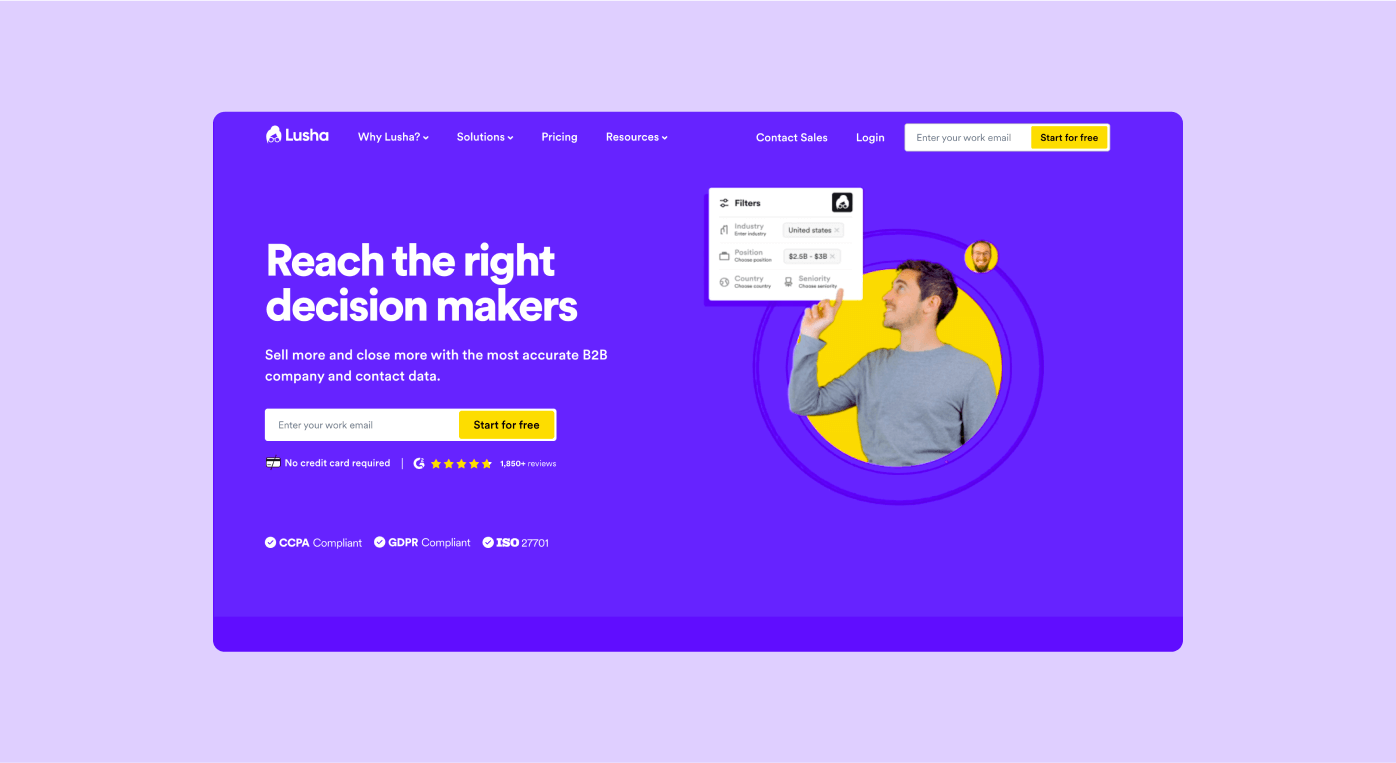
2. LinkedIn Sales Navigator
Everyone knows LinkedIn is the top social media platform for businesses selling to businesses. Sales Navigator leverages the information its members provide. Users can access LinkedIn’s comprehensive database of both individual and company contacts and then refine the data through one of Sales Navigator’s filters.
LinkedIn will also add its own contact recommendations to a prospect list based on the variables of the user’s search. And, being LinkedIn, clients can simply connect with and reach out to the prospects they find through the software.
But that’s about as far as Sales Navigator will take you. It doesn’t provide lists of contact details such as emails and phone numbers. If you want to reach out to a connection, you need to use the InMail feature, which is simply a form of direct messaging (and also limited according to the package you buy). That’s why most people who use LinkedIn Sales Navigator pair it with another sales intelligence tool (like Lusha).
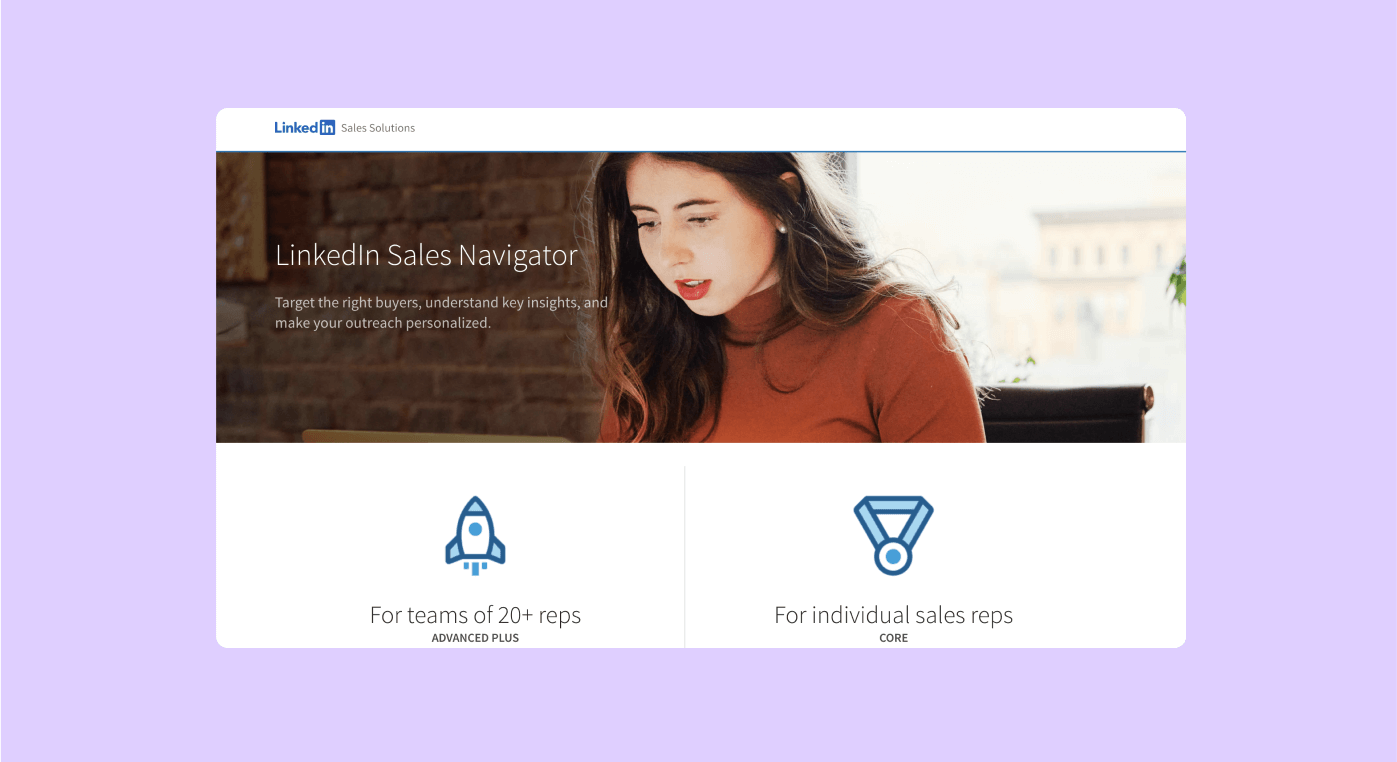
3. ZoomInfo SalesOS
ZoomInfo assists sales and marketing teams in identifying and following up with leads through their offerings that help manage the sales funnel. Using an ideal customer profile, ZoomInfo users can search the database for potential prospects that closely match their dream customers.
ZoomInfo is one of the biggest names in the game, but it comes with its share of disadvantages. These include HQ phone numbers that are mostly for prospects in the US and long refresh cycles. Other concerns include the non-intuitive platform and complicated CSV and CRM setups. Onboarding for ZoomInfo is known to involve whole teams of reps, and can take weeks.

4. Apollo.io
Apollo.io describes itself as an “all-in-one sales intelligence platform.” It provides tools for lead generation, but also for sales engagement and scheduling. Apollo.io even has an application that uses AI to create custom emails.
But it’s not perfect. Like ZoomInfo, Apollo.io shows inconsistent contact data quality levels and a focus on the US. For sales teams that are concerned about privacy regulations, Apollo.io is not formally GDPR-certified, and is unclear about how it collects information. Some users report that the platform and extensions can be difficult to use.
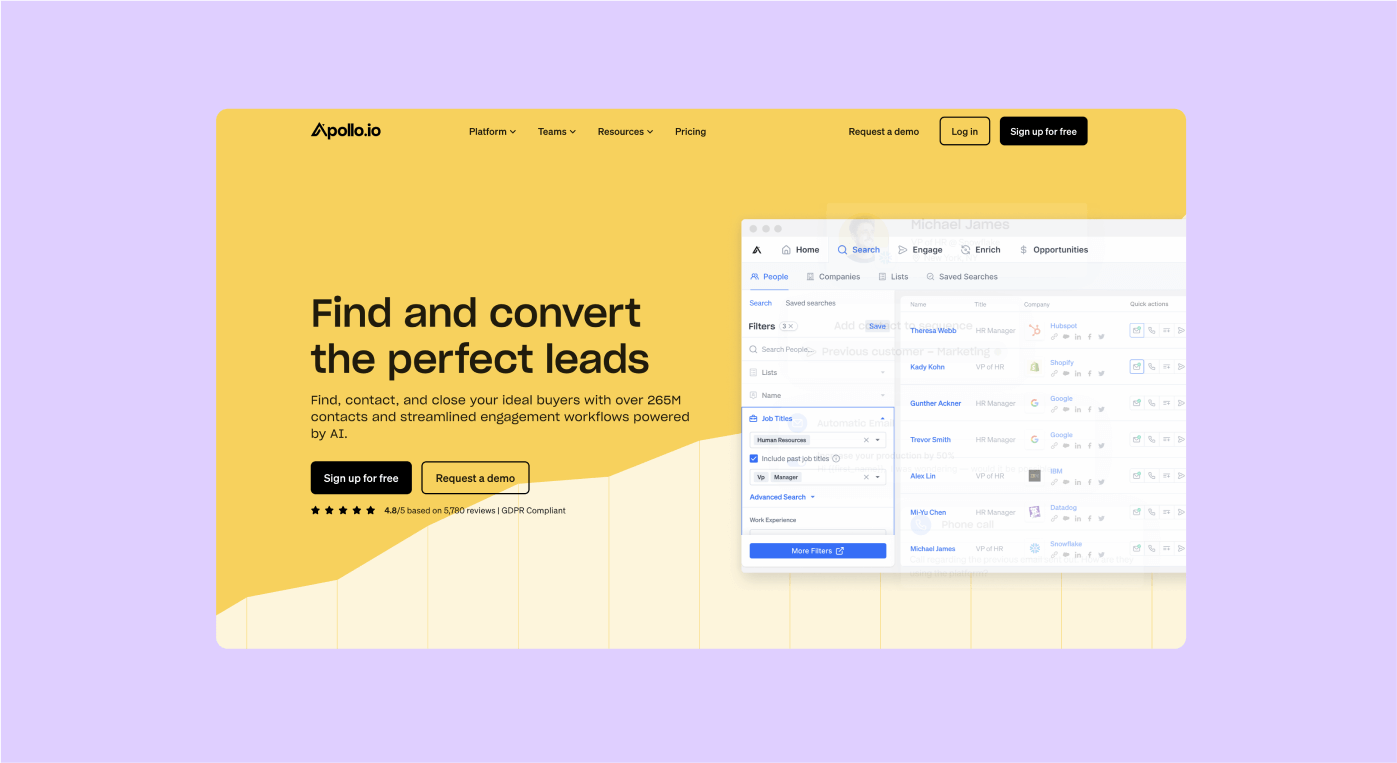
5. D&B Hoovers
Dun and Bradstreet is one of the oldest names in the business information industry and is famous for its credit reporting. D&B Hoovers is its digital sales intelligence arm, which leverages the company information derived from credit scoring. Clients use their service to identify prospects and can get dozens of data filters to refine searches. But with a focus on credit-related information, their ability to collect up-to-date contact data is limited. Keep in mind that D&B Hoovers gets relatively poor reviews for data accuracy and availability.
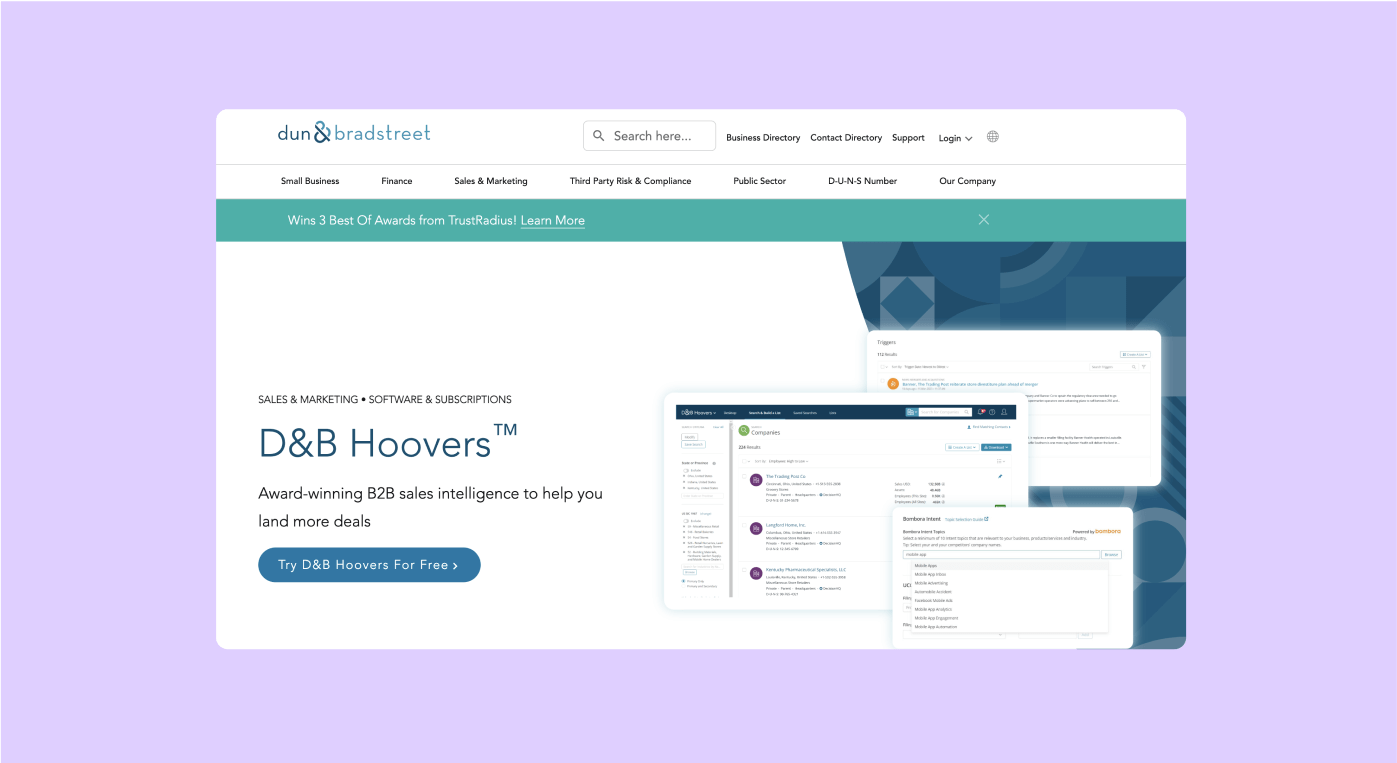
6. Cognism
Cognism bills itself as a global sales intelligence platform. Among its options for contact information are technographics, firmographics, intent data, and business emails.
Their coverage is strongest in Europe, although direct contact information is sometimes lacking. You can request verification on-demand, but that’s not part of a standard package – you’ll have to pay more. At the same time, their platform is said to lack more user-friendly features. Finally, you can’t really try it out on your own before committing; their trial version requires the support of a salesperson.
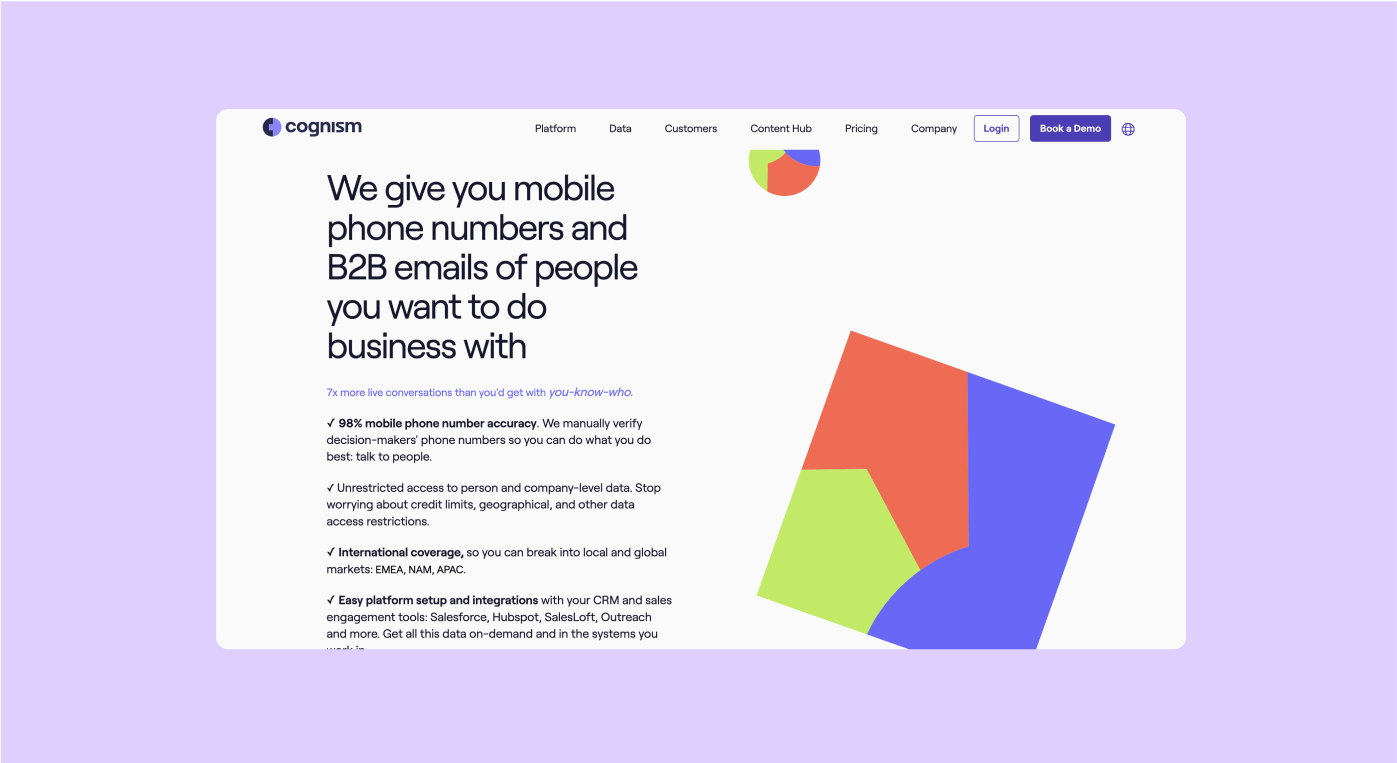
Key Takeaways
- Sales intelligence tools can help sales and marketing teams build and refine prospect lists, perform market research, and expand their reach.
- The goal of sales intelligence tools is to provide accurate information that results in an efficient sales process, including the ability to customize pitches.
- The top sales intelligence software vendors in 2024 include Lusha, LinkedIn Sales Navigator, ZoomInfo SalesOS, Apollo.io, D&B Hoovers, and Cognism.

